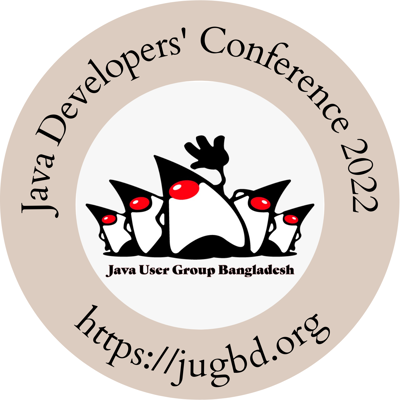Call for Speakers

Java Developers’ Conference, 2022
8 Oct 2022
9 Oct 2022
Dhaka, Bangladesh
jdc22.jugbd.org/
Once more, it's happening!
The 8 Oct 2022 and 9 Oct 2022, Saturday through Sunday, will see the Java Developers' Conference hosted by Java User Group Bangladesh (JUGBD) at Krishibid Institution Bangladesh. This session will be hybrid in nature.
This is going to be a two-day event, with one day taking place virtually and the other taking place in person.
You are cordially invited to this conference. Attending is worthwhile.
Taking part in this event—
- Meet some great Java guys right here.
- While sipping coffee and snacking, converse with your fellow devs about your favourite Java technology.
- Attend the presentations made by seasoned Java professionals (local & international).
- Get gifts (t-shirts) and have a great time.
On the day of the event, kindly bring business cards to exchange with other industry peers. We ask that you distribute this invitation to any additional Java professionals or developers in your network who you believe would find this event interesting.
Watch the Facebook group for any additional developments.
NOTE: Depending on the venue's availability, the date might be adjusted. Though it won't be by much, we'll do our best to keep to the original schedule.
Call for Speakers
24 Aug 2022
15 Sep 2022
If you want to present an interesting Java-related topic to Java enthusiasts in Bangladesh, here is your opportunity. A timeslot has 35 minutes. Attendees often have intermediate-to-advanced Java knowledge and are seeking to expand their practical expertise.
Tracks
- Java language -Core Java APIs, Performance, Debugging, and Java development tools
- Server Side Java -Server side frameworks including Jakarta EE, Spring, Quarkus, and further server-side technologies.
- Alternative JVM languages - Kotlin, Scala, Groovy, and Clojure - provided they run on a JVM ;-)
- Cloud Native, Microservices, Serverless, and Containerization
- Methodology and culture — Software Development Methodologies, Culture, CI/CD, DevOps, Soft skills, developer communities, and developer productivity
- Web & Mobile: Front-end development, SPA, JavaScript, TypeScript, Android, JavaFX.
- Big Data, Artificial Intelligence, Machine Learning, Deep Learning, Streaming Data Processing.
- Software Architecture: How-tos, methods, techniques, and best practises for achieving the optimal software architecture.
- New & Cool - Popular new technology and/or outstanding real-world applications of technology.
Tips for submitting:
A standard session timeslot has 35 minutes. Attendees often have intermediate to advanced Java experience and are wanting to expand their practical expertise. The most valuable seminars consist of best practices, code samples, or live demonstrations.
How proposals will be evaluated
When the deadline has passed, the session abstracts are given to the programme committee, who must personally grade each session using a "five star system" (1: bad — 5: excellent). The committee is comprised of two members of the JUGBD. Members of the programme committee independently evaluate session abstracts based on the following criteria, which are not listed in any particular order:
- Is it a popular topic?
- The diversity of subject matter for this conference.
- Past conferences featured a variety of themes.
- Speaker qualifications (pay close attention to your bio, particularly your previous speaking engagements!)
- Evaluation results from past conferences or universities for the speaker, if any
- Whatever else they may find appealing (that's why they stand out, right?)
The committee then assembles and totals the individual ratings. Exceptionally often, this provides extremely uniform outcomes. Still, making the final cut is a difficult decision. In the event of a disagreement, the JUGBD members have the final say, although the majority of the time we are able to reach an agreement beforehand.
Fortunately, we receive a large number of papers. Typically, more than the number of available session slots. This means we must also disappoint individuals. Occasionally, we receive irate emails or phone calls in response. Therefore, we'd want to communicate this information with you now and set your expectations accordingly.
If you have any questions regarding the call for papers, please contact bazlur@jugbd.org.
Thanks,
JUGBD Content Team.